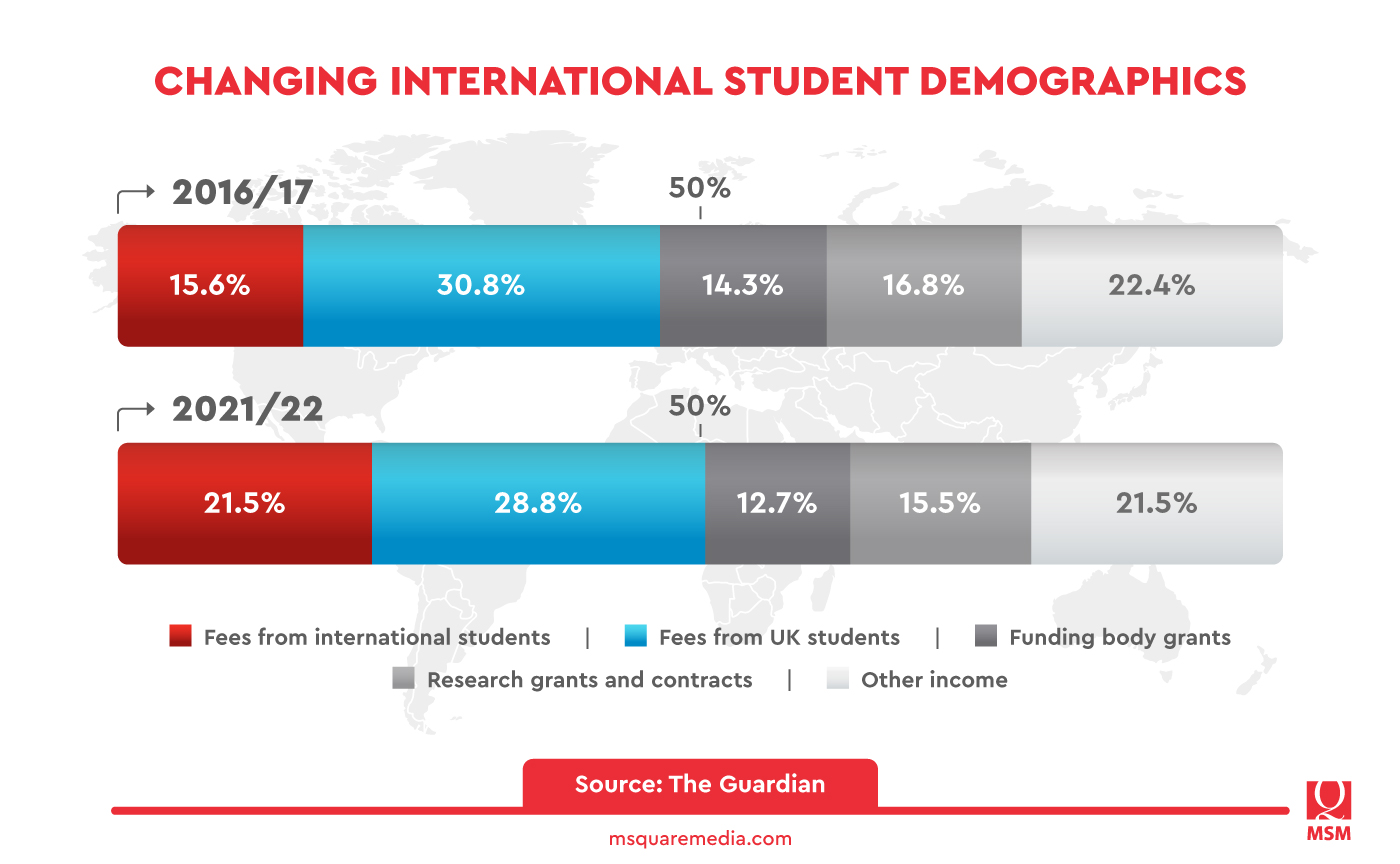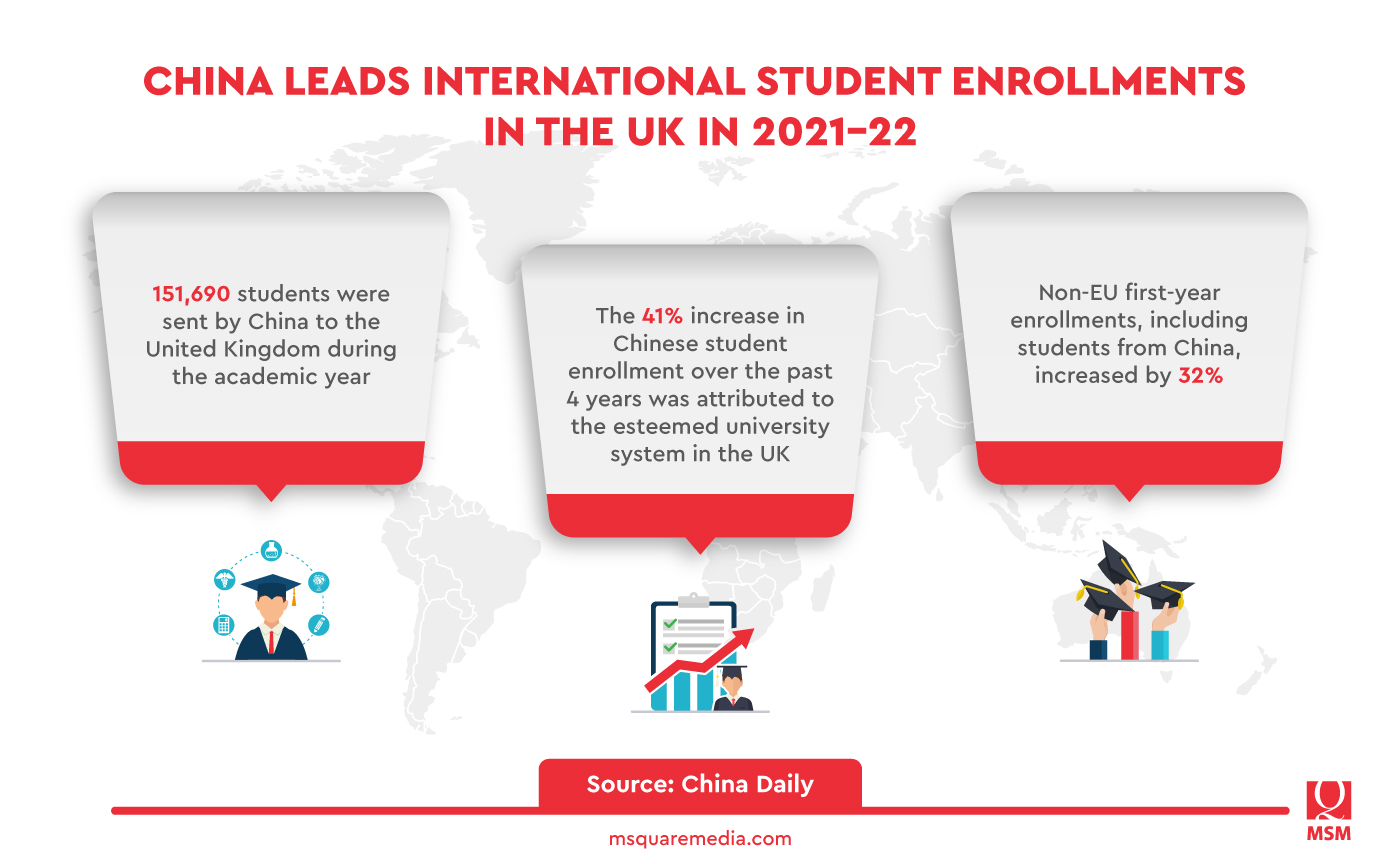Key Takeaways:
- International student tuition fees now comprise 21.5% of UK institutions’ overall income, making them increasingly dependent on these fees for financial stability.
- Concerns arise regarding the financial impact on universities due to the rise in tuition fees for international students and the decrease in government funding allocated per student.
- Enrollments from countries such as India and Nigeria have increased significantly by 48%, while enrollments from the European Union have fallen by 14%, with China remaining the largest source.
- A 2023 report highlights that Chinese students enrolled at UK universities at a record-breaking rate in 2021-22, surpassing students from all other nations, mainly due to the UK’s renowned educational system and geopolitical factors.
According to a Guardian report, UK universities received one out of every five pounds from international students last year, underscoring their growing reliance on foreign tuition fees for financial viability. Several institutions now receive a third or more of their revenue from tuition fees from international students, a percentage that has significantly increased in recent years.
Since 2016-17, around 80% of UK universities have seen an increase in the number of international students, with 30 institutions doubling the number of international students they recruit. Tuition fees from EU and non-EU students contributed more than half of the income of specialized universities like the Royal College of Art and the University of the Arts London in 2021-22, compared to only a third in 2016-17.
The Growing Contribution to the Finances of UK Universities
Over six years, some universities, including the University for the Creative Arts and the University of Hertfordshire, have experienced a significant increase in the share of international tuition fee income, rising from 13% to 33% of total income.
The report expresses concerns that UK students may face challenges competing with their international counterparts due to the increased fees international students must pay, which have become essential to university budgets. International undergraduates pay an average of £22,000 annually in tuition, much higher than the £9,250 maximum for domestic fees in place since 2012.
Changing Demographics and Nationalities of International Students
The number of international students choosing to study in the UK has increased by 48% over the past six years, with significant growth from countries like India and Nigeria. China remains the greatest source of international students, accounting for close to 25%, while the proportion of students from the European Union has decreased by 14%.
Regulators and experts express concerns about the growing dependence on international student fees. The Office for Students (OfS) has requested universities with a significant Chinese student population to submit backup plans in case of unforeseen disruptions in international recruitment. Some universities have come under scrutiny for relying too heavily on tuition from international students, especially when a substantial percentage of those students come from a single nation.

In the last six years, tuition collected from international students has increased by 71%, reaching £9.7 billion for the 2021–2022 academic year. This has risen from 15.6% in 2016–17 to 21.5% of the overall income received by UK institutions. In contrast, over the same time frame, the portion of total income generated by UK student fees somewhat decreased from 30.8% to 28.8%.
China Leading UK's International Student Enrollments in 2021-22
According to a 2023 report, during the 2021–2022 academic year, China sent a record 151,690 students to the UK, outpacing all other nations and alliances, including the European Union (EU). The UK’s renowned university system, perceived safety, and geopolitical tensions were cited as reasons that favored the UK as a preferred study destination for Chinese students, contributing to the boom in Chinese student enrollment, which has increased by 41% over the past four years.
EU student enrollments fell by 21% over that time, while non-EU first-year enrollments, including those from China, increased by 32%. India also saw significant growth, with 126,535 Indian students choosing to attend British universities during the aforementioned academic year. However, concerns about overdependence on the Chinese student market for revenue have been voiced, prompting stakeholders to focus on preserving the attractiveness to Chinese students while preparing for any changes in enrollment trends.

The dynamics of the UK’s post-study work visa program, which helped the country attract international students, are discussed in the paper, making the case that potential adjustments would affect different student groups differently. Despite the long-term trend of steadily declining Chinese student enrollments in the UK, analysts expect that this trend may eventually plateau, necessitating higher education institutions to plan for and adjust to shifting international student populations.
Moving Forward
The information and research provided shed light on how tuition fees from international students are greatly contributing to UK universities. While these students undoubtedly contribute significantly to research and teaching, legitimate concerns about the financial costs have been raised. Universities, politicians, and other stakeholders must collaborate to develop a balanced funding model that addresses the various requirements of both domestic and international students as we move forward.
Striking this equilibrium will not only foster financial stability for institutions but also enhance the quality and choices of students looking to study abroad in the UK. Acknowledging the significant role that UK students continue to play in our academic environment while recognizing the significance of international students is key to maintaining a strong and inclusive higher education system for the benefit of all students. By addressing these issues collaboratively, we can create a prosperous and globally competitive future for UK higher education. (SUNEETHA QURESHI)

SUNEETHA QURESHI
MSM President
Suneetha has worked for 15 years in the international education sector and 25 years overall for her work for other industries. As president of MSM, she fortifies its business development outreach globally, particularly in the face of MSM’s foray into edtech-based recruitment via MSM Unify. She preserves the premium, value-adding services provided to each MSM partner institute, including dedicated teams on the ground, agent management, lead generation and inquiry management, application prescreening, and student and parent support through pioneering pre-departure briefing sessions.
She has an impeccable track record of successfully launching the representative offices in Asia and Africa of many North American and European higher education institutions. Her key strengths include hiring, training, and developing teams as evidenced by the successful results of the dedicated in-country college and university client teams.
Suneetha also has taken the lead in developing several initiatives at MSM, including building robust standard operating procedures, the Rise ‘n Shine team engagement platform, and the organization’s data analytics and audit segments.
Sources:
- Garcia, C., Weale, S., Swan, L., & Symons, H. (2023, July 14). Fifth of UK universities’ income comes from overseas students, figures show. The Guardian. Retrieved from https://www.theguardian.com/education/2023/jul/14/overseas-students-uk-universities-income
- Mingjie, W. (2023, February 10). Nation sends record number of students to UK. China Daily. Retrieved from https://global.chinadaily.com.cn/a/202302/10/WS63e59f6ca31057c47ebae064.html

